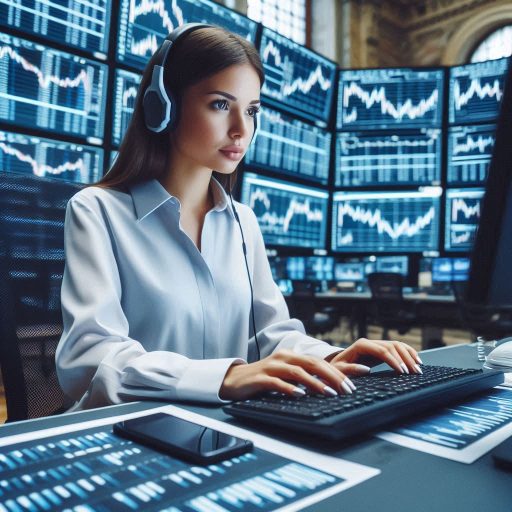Introduction
A securities trader plays a crucial role in the financial markets by buying and selling financial assets such as stocks, bonds, and derivatives.
These traders operate on various platforms, including investment firms, banks, hedge funds, and proprietary trading desks, or they may work independently.
Their primary objective is to capitalize on price movements to generate profits.
They achieve this by analyzing market trends, economic indicators, and financial reports to make informed decisions on when to buy or sell securities.
Traders use various strategies and tools to forecast market movements.
They rely on technical analysis, which involves studying price charts and historical data, and fundamental analysis, which focuses on evaluating a company’s financial health and economic conditions.
Additionally, traders might use quantitative models and algorithms to make high-frequency trades based on complex mathematical formulas.
The importance of securities trading in the financial market cannot be overstated.
It ensures liquidity, which is essential for a functioning market.
Liquidity allows investors to buy or sell assets quickly without causing significant price changes, thus maintaining market efficiency.
This process also helps in price discovery, where the value of securities is determined through supply and demand dynamics.
Accurate and timely price information is crucial for investors to make informed decisions.
Research and Analysis
Conducting Market Research to Identify Potential Investment Opportunities
A securities trader begins the day by conducting market research to spot investment opportunities.
This involves monitoring financial news, industry reports, and economic updates.
Traders assess sectors, companies, and assets to evaluate their growth potential.
Research is essential for uncovering opportunities and staying ahead of market changes.
They consider factors such as company performance, industry trends, and emerging technologies to determine where to invest.
By gathering this information, traders build a foundation for making well-informed investment decisions.
Analyzing Market Trends and Economic Indicators
Analyzing market trends is another key component of a trader’s routine.
Traders closely monitor stock price movements, volume, and market sentiment.
They study trends in specific industries and across the broader market to detect shifts in investor behavior.
In addition, economic indicators like inflation, unemployment rates, and GDP growth are critical to understanding the larger economic landscape.
These indicators help traders forecast potential market movements and guide their strategies.
Understanding how these economic metrics impact stock prices allows traders to anticipate fluctuations and make timely decisions.
Using Technical Analysis to Make Informed Trading Decisions
Technical analysis plays a significant role in a trader’s decision-making process.
Traders analyze charts, historical data, and trading volumes to identify patterns and trends.
Tools like moving averages, support and resistance levels, and oscillators are frequently used to predict price movements.
This analysis helps traders pinpoint the best entry and exit points in the market.
By utilizing technical indicators, traders can react quickly to market changes, minimizing risks and maximizing gains.
Informed by both technical analysis and research, traders execute trades with precision, capitalizing on market opportunities.
Read: Diversity and Inclusion in Investment Banking
Execution of Trades
Executing trades is one of the most critical aspects of a securities trader’s day.
After conducting thorough research and analysis, traders place buy and sell orders through trading platforms.
Timing is everything in the fast-paced trading environment, and traders must execute orders at the right moment to capitalize on opportunities.
They often use electronic trading platforms to ensure transactions are completed quickly and efficiently, minimizing delays that could impact profits.
Placing Buy and Sell Orders Through Trading Platforms
Once traders identify a favorable trade, they place orders through advanced trading platforms.
These platforms allow them to execute transactions in real-time, ensuring they secure the best possible prices.
Traders can place market orders, which are executed immediately at the current price, or limit orders, which specify the maximum or minimum price they’re willing to pay or receive.
Trading platforms provide instant feedback, allowing traders to adjust their strategies as the market evolves.
Monitoring Market Movements and Reacting Quickly to Changes
Traders constantly monitor market movements throughout the day.
Real-time data, including price changes and trading volumes, helps them stay on top of market trends.
When unexpected shifts occur, traders must react swiftly.
A sudden change in a stock’s price or a breaking news event can significantly impact market conditions.
By staying vigilant, traders can adjust their positions, buying or selling quickly to protect their gains or minimize losses.
Managing Risk by Setting Stop-Loss Orders
Risk management is a crucial part of executing trades, and traders rely on tools like stop-loss orders to limit potential losses.
A stop-loss order automatically triggers a sale if the price of a stock drops to a certain level, ensuring that traders do not lose more than they can afford.
By setting these limits in advance, traders protect their portfolios from unexpected market swings.
This strategy helps traders minimize risk while maintaining a balanced and disciplined trading approach.
Generally, the execution of trades requires precision, quick decision-making, and effective risk management.
Traders rely on advanced platforms to place orders, monitor the market closely, and use tools like stop-loss orders to manage potential risks.
Through these processes, they navigate the complexities of the financial markets to achieve successful trades.
Read: Tips for Building a Strong Investment Banking Resume
Communication and Networking
Effective communication and networking are essential components of a securities trader’s success.
Traders regularly collaborate with research analysts, other traders, and industry professionals to stay informed and make sound investment decisions.
This exchange of information helps them gather valuable insights, refine strategies, and keep up with market trends.
Building strong networks ensures traders have access to real-time data and expert opinions, which are crucial for navigating fast-changing markets.
Collaborating with Research Analysts and Other Traders
Securities traders frequently collaborate with research analysts to stay updated on market developments and potential investment opportunities.
Analysts provide in-depth reports on various industries, companies, and economic conditions.
This information helps traders make informed decisions and refine their strategies.
Traders also exchange ideas and insights with their peers, discussing market trends and trading techniques.
By working closely with analysts and fellow traders, they can improve their market analysis and increase their chances of making successful trades.
Communicating with Clients to Understand Their Investment Goals
Understanding clients’ investment goals is crucial for a trader’s success.
Traders regularly communicate with their clients to discuss their financial objectives, risk tolerance, and time horizons.
Whether managing portfolios or executing trades on behalf of clients, traders must ensure that each decision aligns with the client’s goals.
Open communication allows traders to provide tailored advice and recommendations, helping clients achieve their investment objectives while managing risk effectively.
Building Relationships with Brokers and Other Industry Professionals
Traders also build strong relationships with brokers and other industry professionals to gain access to better resources and trading opportunities.
Brokers act as intermediaries in the buying and selling process, and having a good rapport with them can lead to more efficient and cost-effective transactions.
Networking with other professionals in the financial sector, such as investment bankers and fund managers, allows traders to stay connected to the latest market trends, new products, and opportunities.
These relationships also provide access to valuable industry insights that can enhance a trader’s strategy.
In a nutshell, communication and networking are vital aspects of a securities trader’s role.
Collaborating with analysts and peers helps traders stay informed, while effective communication with clients ensures that investment decisions align with their goals.
Additionally, building strong relationships with brokers and other professionals enables traders to access key resources and industry knowledge, enhancing their ability to navigate the markets successfully.
Read: Financial Modeling Skills for Investment Banking

Compliance and Regulation
Securities traders must adhere to strict industry regulations and laws, making compliance a crucial part of their daily routine.
Ensuring compliance helps traders avoid legal penalties and protects the integrity of the financial markets.
Regulatory frameworks are designed to maintain transparency, fairness, and stability in trading activities, and traders must always operate within these guidelines.
Ensuring Compliance with Industry Regulations and Laws
Traders are responsible for ensuring that their trading activities align with industry rules and regulations.
This includes following guidelines set by regulatory bodies such as the Securities and Exchange Commission (SEC) or the Financial Conduct Authority (FCA).
These regulations cover various aspects, such as insider trading, market manipulation, and fair dealing.
Adhering to these rules is essential for maintaining the integrity of both the trader and the financial markets.
Keeping Up to Date with Changes in Regulatory Requirements
Regulations in the financial industry are constantly evolving, and traders must stay updated on changes to ensure compliance.
This involves continuously reviewing new policies, procedures, and legal amendments that affect trading operations.
Traders often attend regulatory training sessions and consult with legal and compliance teams to stay informed about the latest developments.
Failing to keep up with these changes can result in penalties, legal consequences, or damage to their professional reputation.
Reporting Trades and Maintaining Accurate Records
Accurate trade reporting and record-keeping are vital components of regulatory compliance.
Traders must document each transaction carefully and provide detailed reports to relevant authorities when required.
These records include trade volumes, prices, execution times, and other critical information that ensures transparency.
Maintaining organized and precise records allows traders to demonstrate that they are operating within legal and ethical boundaries.
In the end, compliance and regulation are central to a securities trader’s responsibilities.
By following industry laws, staying informed on regulatory changes, and maintaining accurate records, traders can protect themselves from legal risks and contribute to a fair trading environment.
These practices are essential for upholding the credibility of the financial markets and ensuring long-term success in the industry.
Read: Investment Banking in the Age of Fintech
Transform Your Career Today
Unlock a personalized career strategy that drives real results. Get tailored advice and a roadmap designed just for you.
Start NowStress Management
Stress management is crucial for securities traders, given the high-pressure and fast-paced nature of their work.
The demands of real-time decision-making and market fluctuations can create significant stress, impacting both performance and well-being.
Effective stress management strategies are essential for maintaining mental health and ensuring continued success in the trading environment.
Dealing with High-Pressure Situations and Fast-Paced Trading Environments
Traders regularly face high-pressure situations as they make critical decisions in a fast-paced environment.
Rapid market changes, sudden news events, and large trade volumes can create intense stress.
To handle these pressures, traders need to develop resilience and stay focused under stress.
Techniques such as time management, prioritization, and quick decision-making skills are essential for managing the demands of the trading floor effectively.
Developing Coping Mechanisms to Handle Stress and Uncertainty
Developing effective coping mechanisms is vital for managing stress and uncertainty in trading.
Traders often use methods such as deep breathing, meditation, and physical exercise to reduce stress levels.
Structured routines and regular breaks can help maintain focus and prevent burnout.
Additionally, having a support system, including mentors or colleagues, can provide valuable advice and emotional support.
By integrating these practices into their daily routine, traders can better manage the pressures of their role.
Balancing Work-Life Responsibilities to Maintain Mental Well-Being
Maintaining a balance between work and personal life is important for mental well-being.
The demanding nature of trading can lead to long hours and high stress, making it crucial for traders to set boundaries.
Engaging in hobbies, spending time with family, and taking regular vacations can help alleviate stress and prevent burnout.
Prioritizing self-care and personal time ensures that traders remain refreshed and focused, enhancing both their professional performance and overall quality of life.
Therefore, stress management is an essential aspect of a securities trader’s role.
By effectively handling high-pressure situations, developing coping mechanisms, and balancing work-life responsibilities, traders can maintain their mental well-being and perform at their best.
These strategies help ensure long-term success and job satisfaction in the challenging world of trading.
Continuous Learning and Development
In the dynamic field of securities trading, continuous learning and development are crucial for staying competitive and successful.
The financial markets are constantly evolving, and traders must keep pace with the latest trends, strategies, and technologies to maintain their edge.
Staying Updated on Latest Market Trends and Trading Strategies
Traders need to stay informed about the latest market trends and trading strategies to make informed decisions.
This involves regularly reading financial news, analyzing market reports, and following updates from industry experts.
Staying updated helps traders adapt their strategies to current market conditions and identify new opportunities.
Utilizing various resources, such as financial journals, market analysis tools, and news feeds, is essential for remaining knowledgeable about market dynamics and emerging trends.
Attending Training Sessions and Seminars to Enhance Skills
Attending training sessions and seminars is an effective way for traders to enhance their skills and knowledge.
These events provide opportunities to learn about new trading techniques, regulatory changes, and market analysis methods.
Networking with industry professionals and participating in interactive workshops can also offer valuable insights and practical experience.
By engaging in continuous education, traders can refine their strategies, stay ahead of industry developments, and improve their overall performance.
Pursuing Professional Certifications to Advance Career in Securities Trading
Professional certifications can significantly advance a trader’s career and credibility in the industry.
Certifications such as the Chartered Financial Analyst (CFA) or Financial Risk Manager (FRM) demonstrate a trader’s expertise and commitment to the field.
These qualifications often require rigorous exams and adherence to ethical standards, providing traders with a competitive edge.
Pursuing certifications not only enhances a trader’s skills but also opens up new career opportunities and can lead to higher levels of responsibility and compensation.
In essence, continuous learning and development are integral to a securities trader’s career.
By staying updated on market trends, attending training sessions, and pursuing professional certifications, traders can enhance their skills and advance their careers.
These practices ensure they remain effective and competitive in the ever-evolving world of securities trading.
Conclusion
A securities trader’s day is a fast-paced mix of market analysis, trade execution, and portfolio management.
Traders begin early, reviewing financial news, market trends, and global economic reports to inform their strategies.
Throughout the day, they monitor real-time data, make quick decisions, and execute trades to capitalize on price movements.
This requires constant focus and the ability to stay calm under pressure, especially during periods of market volatility.
The profession is both demanding and rewarding.
Long hours and high stress are part of the job, particularly when managing large financial risks.
However, successful trades offer the satisfaction of achieving financial gains and hitting performance targets.
The dynamic nature of the markets ensures that no two days are alike, keeping the work exciting.
For aspiring traders, a career in securities trading presents great opportunities for those with a passion for finance, strong analytical skills, and resilience.
The potential for growth, financial success, and daily challenges makes it an appealing choice for those seeking a high-energy, rewarding profession in the world of finance.




